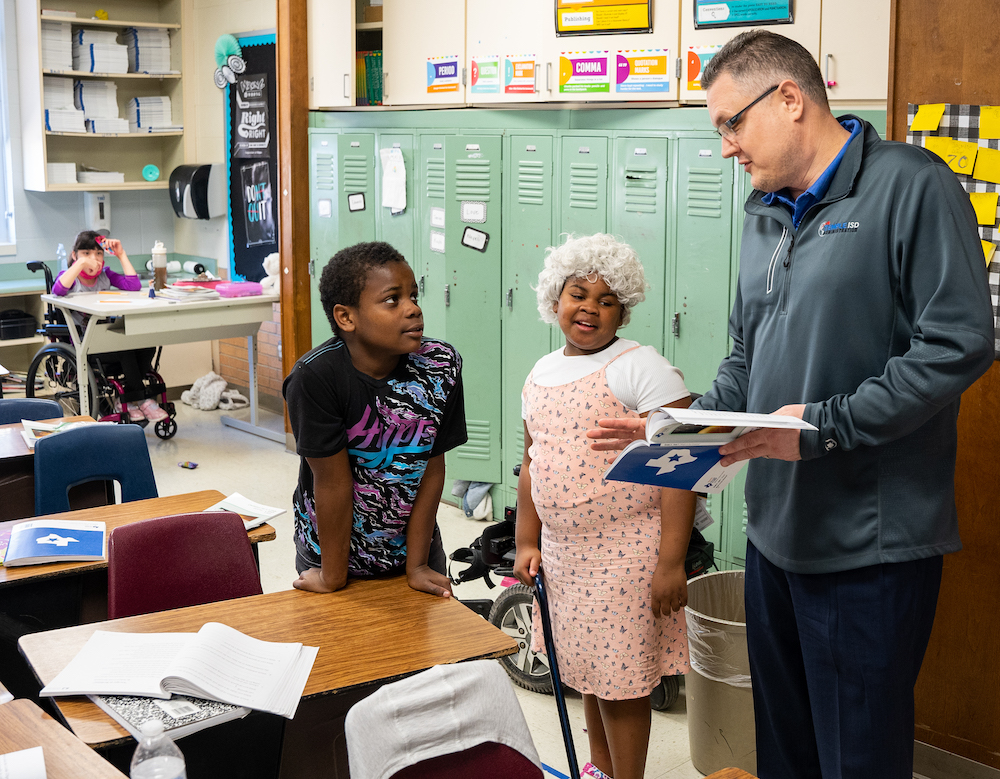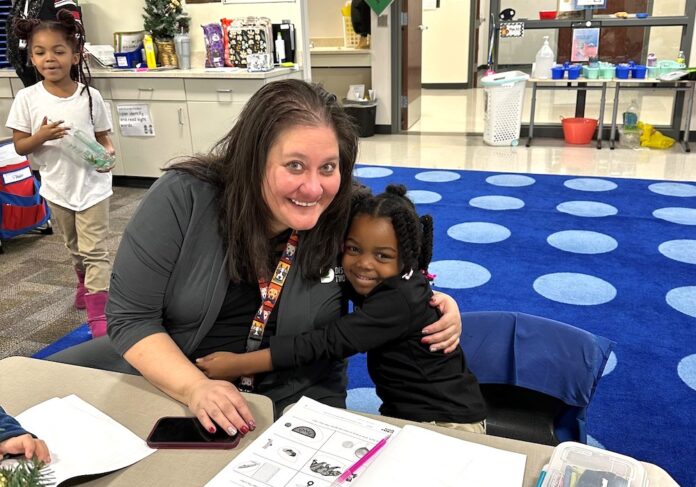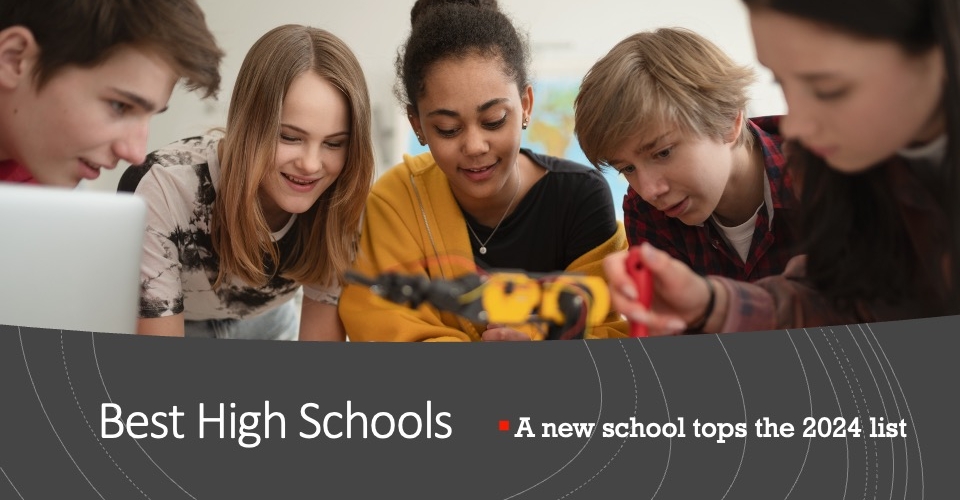The diversity of Harrison School District 2’s student body means not everyone is excited to see the system succeed, Superintendent Wendy Birhanzel laments. But Birhanzel’s selection as Colorado’s 2023 superintendent of the year brings some validation to the inclusivity prioritized by the educators in her Colorado Springs district.
“It’s a district honor that says your voice matters and people are recognizing that great things are happening,” says Birhanzel. “It sends a message to students and the community that you can be successful regardless of your background.”
Sharing the award with her staff students reflects the key elements of her leadership philosophy, which emphasizes strong relationships, high expectations, and putting students at the center of all decisions. This focus on public service is a common element for the three leaders recognized in District Administration’s latest round of superintendents to watch.
‘A huge message of support’
Birhanzel makes a point of spending a lot of time with kids and staff, hoping to get honest feedback on their K12 experiences. “Not everyone gets a yes, but people need to feel valued,” she says. But she does not want the plethora of barriers some of her students face to be used as an excuse for lack of success, she adds.
Harrison School District 2’s strategic plan is built around the three C’s: classroom, culture, and community. Educators are charged with providing a high-quality education that gives students options after high school graduation; building a culture of support and inclusion; and creating a community school district that works with a network of partners to provide food, housing, daycare and other essential resources.
The budget is the biggest issue the Harrison School District 2 faces—Colorado ranks 49th out of 50 for schooling funding, a situation that is magnified in a diverse district that serves many less affluent families. “We don’t have parents who can write checks to get a new football field,” Birhanzel explains. “The funding doesn’t allow us to pay staff what we should pay staff.”
Still, her students are consistently outperforming their peers in other districts, particularly when scores are broken down into key subgroups. The system was also voted the best K12 workplace in Colorado Springs, highlighting the district’s high teacher retention rate. And Birhanzel and her team have built three new schools and redesigned several others with funds from a $180 million bond measure approved by residents a few years ago.
More from DA: Superintendent salary—How 3 states aim to cap the pay of top K12 educators
“That’s a huge message of support,” she says. “Our community doesn’t have a lot of extra money but they value education and they trust the district to do right by kids.”
Birhanzel began her career teaching second grade in Los Angeles, where her eyes were opened to public service and the inequities in the education system. She was one of the few certified teachers in her building in a community where gunfire was a familiar sound. She later became a literacy coach, principal and curriculum director, and earned her doctorate at USC’s Rossier School of Education after doing research on how to use staff effectively in high-poverty school districts.
When she’s not consumed with district operations, she rescues pit bulls. “I have a passion for the misunderstood,” Birhanzel says. “I love to help pit bulls get to safe homes and educate people about not judging them.”
Public service priorities
Diversity—ethnic and economic—is a given in Temple ISD “but inclusion is a deliberate choice,” says Superintendent Bobby Ott, who adds that the keys to his leadership philosophy—”compassion, love, innovation and investing in others”—are anchored in public service.
“I do these things shamelessly, boldly, and unapologetically,” says Ott, Texas’ 2023 superintendent of the year. “I am proud of our children, staff, families and community. Having a bright light shined on their work means so much to them; therefore, it means a lot to me to see them proud.”

One of Temple ISD’s competitive advantages is the region’s business and industry, which has allowed the district to strike extensive career-oriented partnerships. His top priorities for Temple ISD include:
- Restoring normalcy after the pandemic
- Leading as a community service organization and not just an educational institution
- Providing the most innovative academic programming and support for children
- Competing at the highest levels in fine arts, career tech, advanced academics, and athletics
- Putting every child that comes to us in the best position to be successful
- Putting every staff member that comes to us in a family environment that allows them to maximize their abilities and growth
The culture of innovation and progressive thinking that has been created in classrooms has now become an expectation locally and created a statewide identity for Temple ISD, which has been recognized as a “growth district.” “Growth is occurring both residentially and commercially within our attendance boundaries,” Ott explains. “We are attracting corporations such as Meta and institutions such as Baylor College of Medicine, along with master-planned single-family communities.”
The district recently passed the largest bond in its history to build new schools while its school board has not had a contested election since Ott was hired in 2018. “The climate of TISD is stronger than it has ever been,” he pointed out. “We were not as impacted by staff shortages like many surrounding districts, and staff climate reports highlight a supportive and caring culture as a reason for our improved retention rates.”
Looking ahead, Ott, who has served in both large, multi-high school districts and a small rural system, is focused on accelerating learning and closing achievement gaps caused by pandemic disruptions while also keeping up with continued growth and ensuring that teachers are fairly compensated and that students in underfunded special programs have the needed resources.
Advocating for schools and uplifting educators
There is an unwarranted and negative narrative now eroding the public’s trust in K12 schools, says Kristen Rickey, superintendent of Iowa’s West Delaware County Community School District. She has made it her public service priority to advocate for schools and uplift educators. “It’s such a gift to be involved in education in any way you can, it’s so life-changing for so many people,” says Rickey, Iowa’s 2023 superintendent of the year. “It’s helpful to remember that because there are a lot of challenges, those challenges are opportunities for us to make a difference.”
More from DA: 5 ways ChatGPT will drive deeper learning instead of more cheating
Rickey saw firsthand how trust can fuel a highly successful education system when she visited Finland as part of the Fulbright Leader for Global Schools program. “We saw the incredibly important nature of trust as a cultural value,” Rickey explains. “There’s high respect for administrators and teachers, and high trust from parents and authorities, and that just frees up a lot of energy to provide the best education system that you can.”
Preparing students for successful careers is one of her district’s main missions. That work begins in middle school and continues into high school where students can participate in free registered apprenticeship programs in welding, auto repair, agricultural services, and meat cutting. Rickey’s team is now implementing digital portfolios in high schools so students can better demonstrate the skills they’ve developed in complex communications, flexibility, and adaptability, and problem-solving. “A lot of people say they work on those skills but we have operationalized that and have come up with ways to measure it,” Rickey points out.
For the youngest students, the district has fully integrated its pre-K programs so mainstream and special education students spend as much time learning together as possible.
Since the onset of the pandemic, West Delaware County’s educators have spent more time trying to meet students’ social-emotional learning needs. The district’s counselors launched a “Together We Are” campaign to rally the district around mental health care. They raised about $20,000 to supply everyone in the district with a “Together We Are” T-shirt to wear once a month.
“That makes it very visible to our community when they see the entire student body and staff—1,000 people—wearing the same T-shirt,” she says, adding that teachers have also been trained in suicide prevention and mental health first aid.
Rickey started her career as a middle and high school special education teacher and has served as a principal and in other administrative roles. She has also worked as a consultant focused on inclusive practices for special education students. “Every role I’ve had, I just have loved every single one of them,” Rickey concludes. “It sounds a little bit trite, but I meant what I said—this is a gift.”










